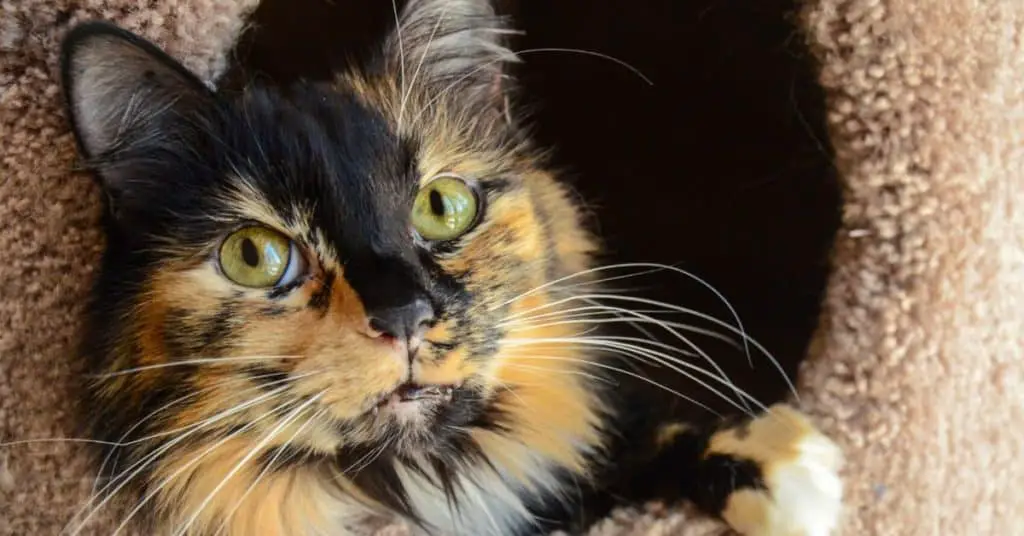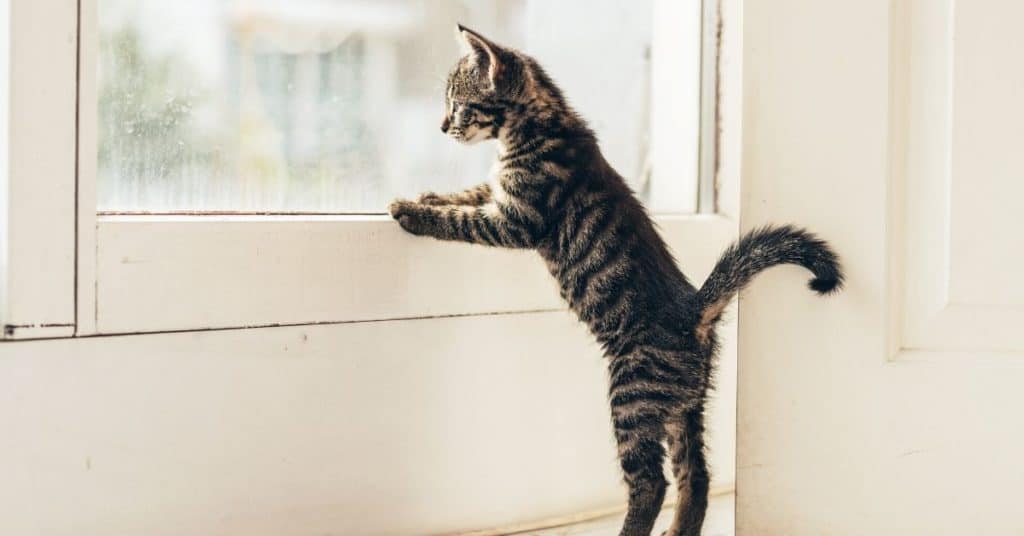The answer to this question is a resounding; YES! If you have ever wondered, “Can kittens live in an apartment?” They are better suited to apartment living than dogs. Statistics show that while dogs are more popular pets, they can be a bit of an effort to keep and maintain in a small space.
This way of thinking has a lot to do with cats’ capacity to be cleaner and quieter than their canine counterparts. The following are things to consider when you think of keeping your cat indoors.
Check with Your Landlord
Before you go out and adopt a cat as your companion, do check with your landlord regarding pets.
Though a lot of people own pets, there are housing units that do not allow them. If you already have one and are planning on transferring to another place, clear your cat with the association that maintains the new building.
In most cases, you will have to sign an additional agreement regarding sanitation and peace with your neighbors. Landlords also have the right to exact additional fees or deposits if you have a pet.
Advantages and Disadvantages of Having a Cat in An Apartment
There are pros and cons to keeping a cat in an apartment.
Different people have different opinions about the matter, so it depends on the priorities of the owner.
I would just like to point out that safety should always be a priority when it comes to animals and humans.
Advantages
- avoid getting lost or picked up by animal services prevent theft of the animal
- safety against other animals, diseases, toxins, etc
- avoid parasites prevent vehicular injuries prevent injury from people who do not like cats/ or wish to inflict injuries on strays
- stop them from hurting or hunting smaller animals (conservation concern)
Disadvantages
- scratching on furniture
- destructive
- lack of exercise boredom/ alienation
How To Make an Indoor Cat Happy

One of the ways to prevent your cat from being destructive and bored in your home is to provide their needs.
Felines have specific needs such as scratching, rubbing, marking their territory appeasing their curiosity and being fit. They do this instinctively so it may be difficult to curb this behavior through discipline.
There are several reasons why cats scratch on furniture, table legs, logs, etc.
- maintenance of nails
- stretches overall muscles
- form of exercise
- relieves anxiety
- marks their territory (visual and olfactory)
A scratching post can help to address many issues with your bored or destructive cat. Several cat furniture designs are especially aimed for nail grooming and muscle stretching.
Some cat owners even design a “highway” for their cats. Instead of using shelves for books and decorations, you can place them close together in such a way that your cat has its own path on your walls away from other not so agile housemates.
No matter how well your dog and cat interact with each other, give both some time apart so they can appreciate each other’s company while they are together. Some pets may need some “me” time and cats will appreciate being out of reach from those below.
Boredom and Interaction
Boredom is an issue with pets that are kept indoors, especially mammals. It is important to provide them with the means to entertain themselves or toys to play with. Bored cats can do some damage when left to their own devices with nothing to vent their boredom on.
If you work 8 hours a day, add an hour for the daily commute; 9 hours is a long time to leave your pet alone in the apartment. Make sure to leave your cat with a clean litter box, water, some food, and plenty of entertainment.
Bored cats can tap into their aggressive behavior. Some will be happy their humans are back while others may be too happy and they will attack you. Playtime is important when you are spending time with your cat.
Interaction can help them deal with their pent up anxiety and their feelings of yearning for you while you were away.
Containing Litter Box Odors and Dealing with Accidents
Litter box smells can be the stuff of nightmares! To avoid having a stink bomb in your home, read through the following tips:
Scoop poop and pee daily (twice a day is better for your nose and your cat’s hygiene).
If you leave the pop and pee too long in the litter, the smell could stick to the area and the litter box.
Change the actual litter after a few weeks. It could look clean because there is no clumping but there could harmful bacteria in it.
Clean litter box regularly (weekly is best). Do not use strong chemicals to clean the box, this could turn your cat off from approaching the box.
Cats are sensitive to strong smells and will not appreciate the smell of bleach or cleansers on their belongings.
Change the litter box once every few years, depending on the condition of the box.
No matter how durable the box is, it will encounter wear and tear from your cat and your cleaning methods and supplies.
Get the right size box for your cat. Small boxes might get smeared or sprayed on when your cat relieves itself.
Experts recommend getting a box longer and wider than your cat by several inches.
Make sure the litter box is in a well-ventilated area. Odors and funky smells dissipate faster and better in well-ventilated spots.
Once your cat is comfortable with his litter box, there is a very low risk of him making a mess or having an accident while you are away at work. The box must be the right size, contain clean and fresh litter ( you have to get rid of the litter if it is several weeks old already), the actual box be in good condition,
Indoor vs. Outdoor Time

Cats are safer inside the apartment, no matter how many times people ask you “Can kittens live in an apartment?” Their concern is founded on their belief and this could have validity but it is your cat and you are entitled to look out for its safety and well-being.
This does not mean that you will never bring your cat outside. You have several options to choose from if you want to let your cat experience the outdoors.
You can install a screened window so your cat can experience first-hand what goes on outside of your apartment.
Cats are easily entertained by watching the daily goings-on of their community through the safety of a screen. If you have safety issues with a screen, you can put up a perch near a window so he can see outside.
You might also consider getting a cat leash for your pet so you can take him out for walks when you have the time. It is best to start training your cat to use a leash while it is still young.
Start with a collar with ID and when he gets used to it, start by just attaching a short, light leash on the collar. A harness may be better than a collar. Collars tend to choke if they are too tight while a harness will fit comfortably around his chest.
Practice inside your apartment before taking him out because he might act out get loose.
Large Toy Selection
Indoor cats would be stimulated by playing with them and exposing them to various toys. Stalking chasing, pouncing, and kicking are just a few of the many ways that your cat will play. There are a lot of choices for stimulating toys for cats in pet stores. Fabric toys stuffed with catnip are also cat favorites.
There are also some do-it-yourself toys from recycled items. You will be amazed at what can keep your cat entertained for hours on end. Boxes with lids or holes can be amusing for your cat. Open-ended canisters are also a delight for your four-legged buddy.
It is important to play with your cat and leave him to amuse himself even when you are around. This will teach him to play on his own when you are not around. Keep his toys accessible.
Related Kitten Keeping Posts
13 Kitten Keeping Must-haves
- High Protein Grain-Free Dry Kitten Food
- High Protein Grain-Free Wet Kitten Food
- Stainless Steel Food and Water Bowl
- Kitten Health Record Keeper
- Van Ness Small Litter Pan
- Kitten Training Cat Litter
- Kitten Dental Care Toothbrush Toy
- Cat Tongue Textured Grooming Brush
- Pioneer Pet Ultimate Scratching Post
- Kitty City Cat Tunnel Bed
- Cat Tracks Chasing Balls Cat Toy
- Rainbow Cat Dancer Toy
- KitNipBox – Monthly Cat Subscription Box of Cat Toys, Treats and Goodies
